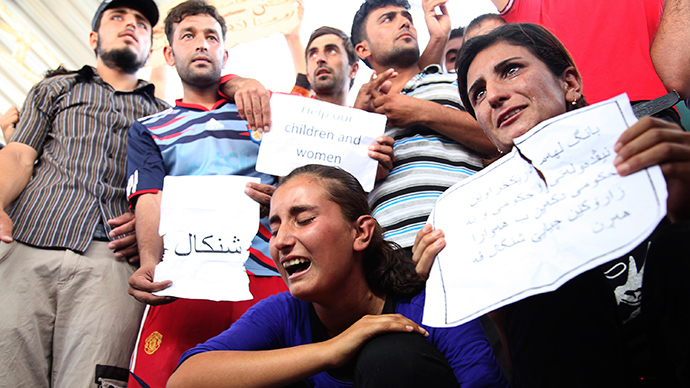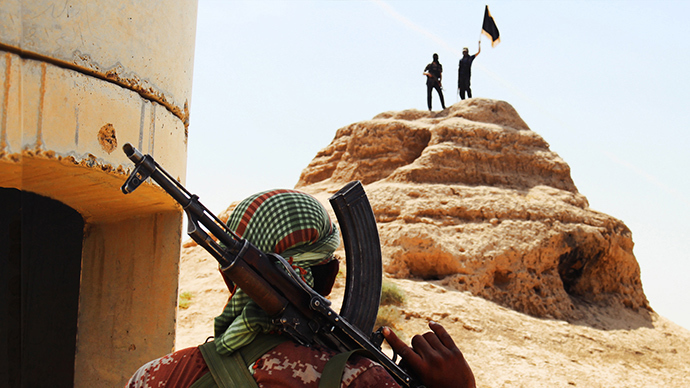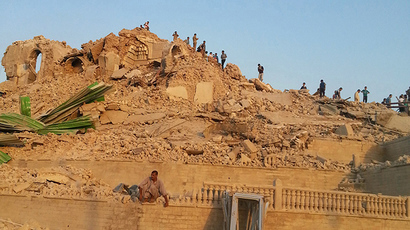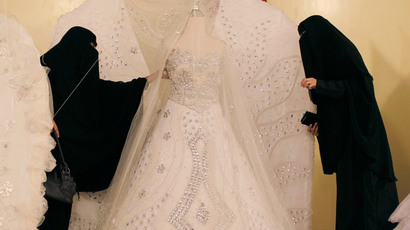Over 30,000 Iraqis trapped in mountains as IS threatens to kill them

Thousands from the minority Yazidi community are stranded in the mountains of northwestern Iraq. If they make a move, they face slaughter at the hands of Islamic State jihadists surrounding them. However, they risk dying of dehydration if they stay put.
Many of those trapped are women and children taking refuge in
nine locations on Mount Sinjar – a craggy ridge which, as legend
has it, was the last resting place of Noah’s ark.
Vian Dakhil, a Yazidi lawmaker, said the siege has already cost
many lives, including children.
"Seventy children have already died of thirst and 30 elderly
people have also died," she told the Guardian. "Over the
past 48 hours, 30,000 families have been besieged in the Sinjar
Mountains, with no water and no food.”
Baghdad sent helicopters to drop supplies to people on the
mountain, though the amounts were limited.
“Food is low, ammunition is low and so is water. We have one
piece of bread to share between 10 people. We have to walk two
kilometers to get water. There were some air strikes yesterday
[against the jihadists], but they have made no difference,”
Nafiee, a man hiding on the mountain, said.

At least 500 Yazidis, including 40 children, have already been
killed over the past week. Many more have received death threats,
either from IS militants or members of the Sunni community who
have allied with them for fears of reprisal.
Another 130,000 Yazidis have fled the city of Sinjar for Dohuk
and Irbil in the Kurdish controlled north, where authorities are
struggling to cope with one of the biggest refugee movements in
decades.
“We are being told to convert or to lose our heads. There is
no one coming to help. They were our neighbors and now they are
our killers,” said Khuldoon Atyas, who stayed behind to look
after his family’s crops. Before the siege, Sinjar was home to
300,000 people.

One man told Amnesty International that 30 members from two
families were seized by IS from the village of Khana Sor, located
northwest of Sinjar.
“They took the 15 men and took the women and children and
until now we do not know what happened to them, where they are or
if they are alive or dead,” he said.
Sunni jihadists have long regarded the Kurdish minority Yazidis
as devil worshipers, and have targeted them since the US-led
invasion of 2003. Flights to a safer area is now the only option
left.
“It’s not like this is a one-off incident. We are almost back
to square zero in terms of the preparedness and the supplies.
Enormous numbers of people have been crossing the border since
June,” said UNICEF spokeswoman Juliette Touma.
“We are being slaughtered. Our entire region is being wiped
off the face of the earth. I am begging you in the name of
humanity,” Kurdish MP Vian Dakhill said as she broke down in
tears in parliament.

Kurdish peshmerga forces are reportedly in the area and have said
they are starting to fight back. However, they are only lightly
armed and have been unable to reach the refugees.
The Islamic State, formerly known as ISIS, has steadily conquered
much of Iraq’s north and west. On June 10, the hardliners – who
want to create a medieval style caliphate stretching across Iraq
and Syria – stormed Iraq’s second city Mosul, sending the Iraqi
army fleeing for their lives. The central government in Baghdad
now has no influence over much of the country, which is now
controlled by IS.
IS was able to loot Iraqi army weapons and arsenals, and has now
captured three cities – including Tikrit and five oilfields. The
extremist group is also closing in on the capital Baghdad.
The UN Security Council said ISIS militants pose a threat not
only to Iraq and Syria, but to "regional peace, security and
stability."
"Widespread or systematic attacks directed against any
civilian populations because of their ethnic background, religion
or belief may constitute a crime against humanity, for which
those responsible must be held accountable," the Security
Council said in a statement.














